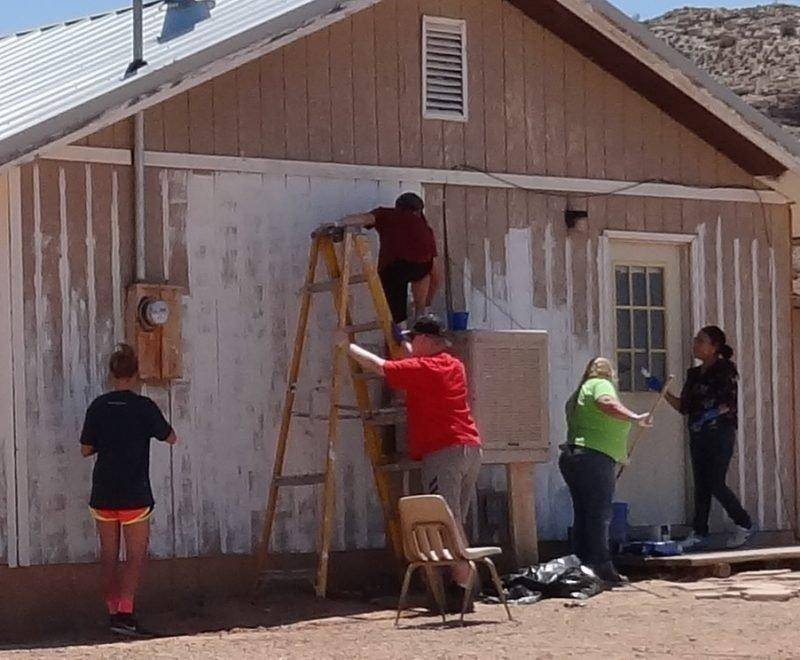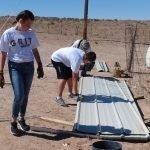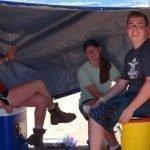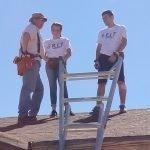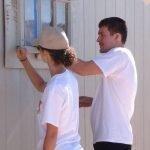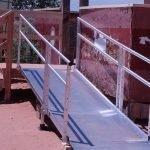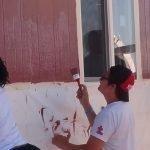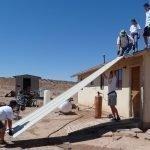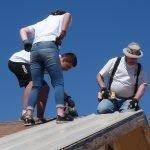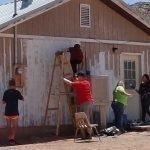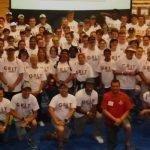SEUALG Press Release
It’s hot, it’s hard work, and sometimes the time spent at the Group Camp that is run by the Southeastern Utah Association of Local Governments (SEUALG) on the Navajo Reservation in southeastern Utah can be a little inconvenient, but it is worth while to those that participate.
In June of each year, a group of workers, some state employees, some county employees and some volunteers come together to help improve homes for those among the Navajo Nation in Utah.
This year, that group camp took place the week of June 18 and, during that time, the workers who arrived from far and wide renovated 17 homes. The work took place in the Aneth Chapter of the Navajo Reservation.
“The Aneth Chapter includes pretty much everything from where the San Juan River enters the state of Utah over to Bluff,” said Gary Arrington, the Manager of the Weatherization program for the SEUALG. “The group camp is sponsored by SEUALG, the State of Utah Weatherization and Group Care, which is a non-profit that is based in Boulder, Colorado.”
Group Care provides the youth work force that participated in the week-long work project along with adult leaders to aide and direct them. The State of Utah provides the funding while state and AOG weatherization employees help guide the work.
“This year, we also had a gentleman from the Utah Department of Housing, one from the Six County AOG and another from the Bear River AOG that came to help us,” stated Arrington.
The Executive Director of SEUALG, Geri Gamber, said that the local agency could not run the camp alone without all the other agencies and support groups assisting.
“Group Care is a large part of this program and without the support, Brad Carpenter at the state the program probably could not operate the way it does,” she said. “It is a team effort.”
By Arrington’s account, this year they labored putting on metal roofs, repainted homes, put new porches in, installed metal handicapped ramps as needed, and they had “three siding jobs because siding was falling off of houses and we took it apart and replaced it.”
“All our efforts are to preserve the integrity of the homes so they last another 20 to 40 years,” he said.
The Work Camp volunteers consisted of 114 youth and 19 leaders that came with them.
“These people are from all around the country,” said Arrington. “Most of the youth are in high school but sometimes there are some ninth graders as well. They come from all over. Kids with me working this year were from Ohio, Iowa, Colorado and Massachusetts.”
Through Group Care, the students sign up to go early in the year and they look forward to it, said Arrington. He said the students actually pay money to come and work and must also provide their own transportation to get to the area.
The structures that are worked on come in all ages and conditions. Some are less than 15 years old while others are 40 years old.
“Most homes on the reservation are built one way or another with Navajo funds,” said Arrington. “The people who live in them do not own the land. The tribe owns the land, but the residents get a lease on the land for what appears to be perpetuity. Homes that you see in groups on the reservation usually have people who are related to each other in them.”
While many of the homes are in rural tribal areas, some of the homes that are worked on are in towns such as Montezuma Creek and Aneth. Arrington said that when you are out in the rural area, you better know the spread and what dirt roads to take. When the clients apply for the project, they must supply a map for the workers to use to find the home. There are no addresses in the outer areas of the reservation.
“When we go out to appraise what we will need to do, we GPS the sites,” said Arrington. “That makes it easier for the next person to find them.”
Resident”s homes qualify for the Group Camp efforts through the HEAT Program. Along with Arrington, those from SEUALG who helped out on this year’s Group Camp were Tyson Benally, Evan Howard, Nelson Yellowman, Heather Balchinclowing and Greg Kinoshita.
Arrington said the residents look forward to the group coming. One of the requirements to have the work done is that the residents are at home the entire week. There is also more that the Group Camp does for the clients they work with.
“We provide a grocery basket for the residents,” he said. “The funds for that comes from a grant from American Express that allows for about $500 of food. We try to make it special for the clients.”
As far as accommodations for the youth, the local high school becomes the center of activities. This year, it was Whitehorse High School. The students stay there with their leaders in a dormitory-style setting. As for the state and SEUALG employees, they stay at a local motel, and for the ones that live locally, at home in the evening.
“Group Care actually rents the school and hires school staff to help out in terms of facilities and food preparation,” he said.
This year’s camp was very warm and Arrington pointed out that virtually no homes have any grass or trees by them. Some years, they find homes that don’t even have running water or any electricity from the grid. Some have solar units, but some residences have no power at all.
“Kids in the group learn to use outhouses,” said Arrington. He also said that service for cell phones on the reservation is spotty and he communicates with his work crews by text.
However, for a lot of the student workers, the fact there is literally no service is probably a shock.
Despite the heat, the hard work and being away from home for a few days, the employees of SEULAG and others love the time they spend helping people on the reservation, as well as working with kids from all over the country.
“It is all kind of amazing,” concluded Arrington.
- Photos courtesy of Heather Balchinclowing

